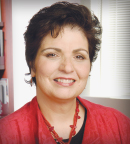
Electra D. Paskett, PhD
As a three-time breast cancer survivor, when the COVID-19 pandemic hit the United States this past January, I knew I had to do everything I could to avoid getting the virus. A host of lingering side effects from my surgeries, chemotherapy, and radiation treatments have left me with cardiovascular problems and lymphedema. I also have asthma, heterozygous Factor V Leiden mutation, and prediabetes, conditions that make me particularly vulnerable to serious illness—and possible death—from the coronavirus.
To protect myself from coming into contact with the virus, I obsessively adhered to the Centers for Disease Control and Prevention guidelines, including wearing a mask, staying 6 feet apart from others, avoiding crowds, and washing my hands frequently. I sequestered myself at home, participated in our cancer center’s core grant site visit preparation and actual site visit by Zoom, and ventured outdoors only when absolutely necessary.
In August, my husband got COVID-19 and, after a call with my oncologist who told me to be extremely careful because cancer survivors do worse with the virus than people who have never had cancer, I amped up my vigilance. We stayed isolated, wore masks around the house, and washed our hands when packages arrived. Despite these efforts, in November, after a visit from a friend who, except for a headache, did not have any of the classic symptoms of the virus, I tested positive for COVID-19.
Realizing I Was in Real Trouble
I soon developed symptoms of the virus, including a mild sore throat, cough, racing heart rate, and breathlessness. After calling my oncologist for advice, she insisted I go to the emergency room to get tested for the virus, which was positive. Because of all my health conditions, I was advised to spend the night in the emergency room, so I could be closely monitored. I received a chest x-ray, which found pneumonia in one lung, and a nebulizer treatment and was started on anticoagulants. That is when it hit me that I could be in real trouble. I didn’t know that COVID-19 raises the risk for blood clots, which could be especially dangerous for someone with a heart condition, asthma, and Factor V Leiden.
After I was admitted to the hospital, a colleague called to ask if I would participate in a monoclonal antibody clinical study, which I readily agreed to do.
Being a COVID Long-Hauler
Although it has now been 6 months since my diagnosis, I am still feeling the effects of the virus. I’m one of the many long-haulers who are still contending with fatigue and what has been described as COVID foggy brain. My sense of taste and smell have not fully returned to normal. Earlier in the course of my illness, I had developed a more serious symptom, orthostatic tachycardia, which caused me to faint if I stood up too fast from a bending position.
Having COVID-19 is no joke. It is a killer, as the nearly 550,000 deaths from the virus in the United States and approximately 3 million deaths worldwide have shown,1 which is why it makes me so angry when people refuse to wear a mask, stay socially distanced, and avoid crowds. Is that really too much to ask to protect yourself and others, especially those with comorbid conditions such as cancer, from contracting the virus and possible death? Despite widespread vaccinations underway, we all still need to wear a mask, socially distance, and wash our hands.
Staying Vigilant
I’m writing this story to be a role model for other cancer survivors. I want oncologists to be especially vigilant with their patients about warning them of the dangers of getting COVID-19 because the combination of diseases can be lethal. Patients should be schooled in the symptoms for COVID-19, where to get tested if they suspect they may have the virus, and the importance of getting vaccinated as soon as possible.
Since my coronavirus diagnosis, I have launched a couple of COVID-19 surveys to track self-reported symptoms, prevalence of screenings, and vaccination intentions. It is also our goal to improve education about the virus and the benefit of the vaccine in underserved minority populations, where vaccine hesitancy is high.
Ensuring Equal Care for Patients
I’m fortunate. I have had a good outcome from COVID-19, but I know what it feels like to be isolated from family and friends and to carry a big red “C” on my back. As a cancer researcher, I benefited from knowing the medical system. I knew whom to call and how to get help when I needed it, but I worry about people who aren’t so well connected.
As oncology professionals, we have to ensure that all of our patients have the resources they need to access high-quality and equal care. We now also have to ensure that they have the education needed to prevent COVID-19, so thousands more don’t die of this virus.
REFERENCE
1. Johns Hopkins University & Medicine Coronavirus Resource Center: COVID-19 Dashboard by the Center for Systems Science and Engineering at Johns Hopkins. Available at https://coronavirus.jhu.edu/map.html. Accessed April 9, 2021.
Dr. Paskett is the Marion N. Rowley Professor of Cancer Research at The Ohio State University; Professor and Director of the Division of Cancer Prevention and Control in the Department of Medicine, College of Medicine; Professor in the Division of Epidemiology in the College of Public Health; Associate Director for Population Sciences and Community Outreach; and Director of the Center for Cancer Health Equity at the James Cancer Hospital.
Editor’s Note: Columns in The Patient’s Corner are based solely on information The ASCO Post received from patients and should be considered anecdotal.

